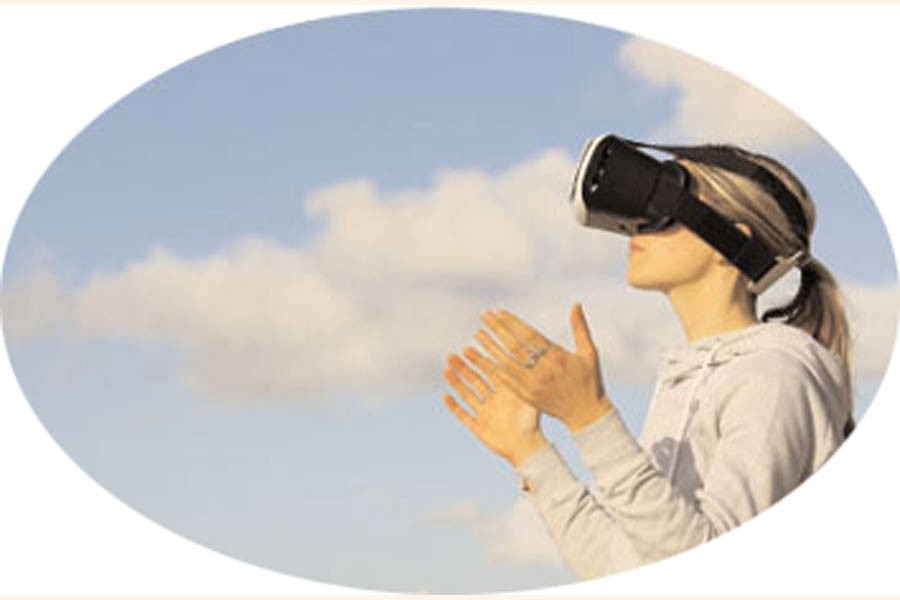The education sector, which relied on online methods to adapt to this new pandemic reality, has seen massive technological changes globally. With this new push, developing countries, like ours, are coming forward in embracing some new technologies that will reshape the future of education. Some of the popular and efficient technologies are discussed here that can really change the image of the education sector in Bangladesh.
Augmented reality
Augmented reality or AR is an advanced technology where the natural environment around us is 'enhanced' or some digital elements are added using artificial intelligence and other techniques, on our mobile phones or other device screens.
One of the most popular examples of AR is the Pokemon Go game. In this game, one had to walk in the streets in real-time and 'capture' Pokemon creatures on the phone screens that roam around in the real-world environment. The technology is continuously developing and it now includes audio, somatic, olfactory and other sensory devices to provide information.
In education, augmented reality has the potential to bring revolution. Especially in practical learning sectors, AR could bring another dimension to the classroom. In medical sciences and engineering, teachers in developed countries have already started using AR devices to teach their students.
Bangladesh, despite being somewhat lagging in technologies, could actually benefit by quickly adopting this. As the education system lacks proper equipment for practical education, especially in the rural areas-- where students lack even the most basic equipment, this technology could be a game-changer.
Virtual learning environment
Virtual learning environment or VLE has seen widespread use in this pandemic. In developed countries, where education has shifted online, VLE has been the main medium of learning.
VLE works as a virtual school. Teachers can take live classes there, post notes or books, work with students and listen to their problems. Basically, it is a learning platform that provides multitudes of learning materials for students to interact with.
In Bangladesh, classrooms in schools and colleges are usually overpopulated. There is a common complaint, both from teachers and students, that they cannot engage properly due to the high number of students in a single classroom. VLE could help remove this problem. As the materials needed in a VLE i.e. smartphone, computer, are easy to access, this module could finally bring equality in education in Bangladesh, given that there is proper internet and equipment is provided to all.
Artificial intelligence
Most of the technologies used in education, including the aforementioned two, are dependent on AI. AI is simply a machine's intelligence which it learns from human behaviour. It is used for auto-grading, checking plagiarism, cross-referencing data in the education system, even performing admin works, like-- counting the presence and absence of the students, compiling results and providing statistics.
Bangladesh has not been able to incorporate AI into its education system yet. But using AI could change the approach of education, by allowing teachers to rely more on technologies for administrative work and prioritise teaching in classrooms. Also, this tech will allow personalisation. Since the level of intelligence, learning capacity, desire, concentration span, etc. varies from student to student, AI can simply learn those traits and make learning personalised for each individual.
Massive online open courses
There are many open online learning platforms like Coursera, Udemy, Datacamp, etc. These sites offer various learning opportunities on a wide number of topics, using different methods. These types of platforms are called 'Massive Online Open Course Platforms' or MOOCs in short.
MOOCs have been a revolutionising aspect of global learning. The traditional or formal setting of education has always been the subject of criticism. The most common complaint about the conventional system is that it does not provide equal opportunity for all. MOOCs have been appreciated by such critiques, as education is now practical and widely available to anyone who wants it.
For Bangladesh, MOOCs could be a blessing. A country with a large population and high unemployment could easily use these platforms to improve the skill of the working-age population. Platforms like 10 Minute School, Kishor Batayan, Muktopaath, etc. are already doing a great job in this regard.
Learning management system
Learning management system or LMS is software that provides administrative or evaluative services in the education system. Much like the VLE, it is sort of an online platform for student and teacher interaction. But the similarities end there.
VLE is used for providing students with materials and learning; LMS is mainly used for evaluating students' performance. It is used for submitting and rolling out assignments, examination questions, class quiz and making various announcements. Some LMS perform like VLEs and provide options for learning. A soft example could be the search engine Google's LMS platform- Google Classroom.
Bangladesh has already seen the application of LMS systems. Some universities have been able to create their own LMS system, many are using common platforms like Google Classroom. Application of LMS on a larger scale, even in a post-pandemic world could be very beneficial for students.
Adapting to new realities is a part of evolution. Rather than seeing it as a threat, the traditional education system could assimilate with new technologies to provide a better and smoother future for the students.

- Wednesday, 1 January 2025 |
- Today's FE |
- e-Paper |
- Beta Website

